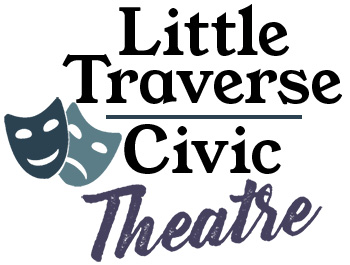Ross Stoakes
Ross Stoakes (1910-1992) In 1944 Ross Stoakes moved to Petoskey from Escanaba, Michigan to join the faculty of Petoskey High School as an English teacher. After graduation from DePauw University with a major in music and English, he spent several years teaching in Sault Ste. Marie and in Escanaba. During his years at Petoskey High School he wrote the words and music for the marching song, “P-E-T-O-S-K-E-Y” – sometimes referred to as “The Loyalty Song”.
Community Theater – Why?
by Ross Stoakes
Acting has been a part of every historical culture from tribal enactment of legends and myths to the present day of total realism, much of which disturbs conservative minds. In whatever period of history we may choose, we find serious drama reflecting universal truths. It may be the tragedies or comedies of ancient Greece, the religious portrayals of the Middle Ages. Shakespeare’s classics, or the ‘way-out’ plays of modern writers. We often think that only deep, serious plays reflect a culture, but comedy has just as legitimate a place in the acting world and can give an insight into the type of society prevalent at the time it was written.
Almost everyone to some degree has a bit of the “thespian” in his personality. It may be confined to solo fantasy of pretending to be someone else, or it may be actually taking a part in a skit or a play presented for a specialized group or the general public. Play-acting goes back to childhood. We may have “played house” or vigorously acted out “cops and robbers” or “cowboys and Indians”. From those early experiences the desire to be a real actor has led many into studying professionally for legitimate theater or films. Others have had great pleasure in using their ability in various phases of community theater. Still others simply enjoy seeing a well-produced play, whether it is done by professional companies or by their friends and acquaintances.
Did you know that American community theater engages more theatrical activity, albeit part-time, than all the rest of American theater combined? Its audiences run into the millions. Community theater is our most direct attempt in America at the present time to create a true people’s theater. In many countries of the world, theater is subsidized by the government. Not so in this country. Here, any type of theater makes its own way.
A civic theater, is an amateur-volunteer project. I have avoided the word amateur up to now, for to many in a community it connotes a dull, inept production of a play. But today all community acting groups strive to present as finished and well-paced a performance as is possible within the capabilities of the groups. Therefore, with the amount of time and effort expended by those participating, it behooves the citizens of an area, to attend productions and support a civic theater in any way they can. For it is an accepted fact that community theater adds an important ingredient to the overall culture of an area.
For those working on a theater production the activity offers a splendid means of self-expression, whether it is creating a costume, a stage scenic background, a lighting effect, or a role on stage.
Little Traverse Civic Theater has always been an open organization. The only requirement for membership is a conscientious desire to help in whatever phase of theater interests a person. And there are many phases, which are fully as important as the acting on-stage. Likewise, while not designated as members of the organization, each person who attends our productions is vital to our continued existence.
So, whatever community theater is those who are a part of it in any way can feel that they are members of an important movement in American life.

